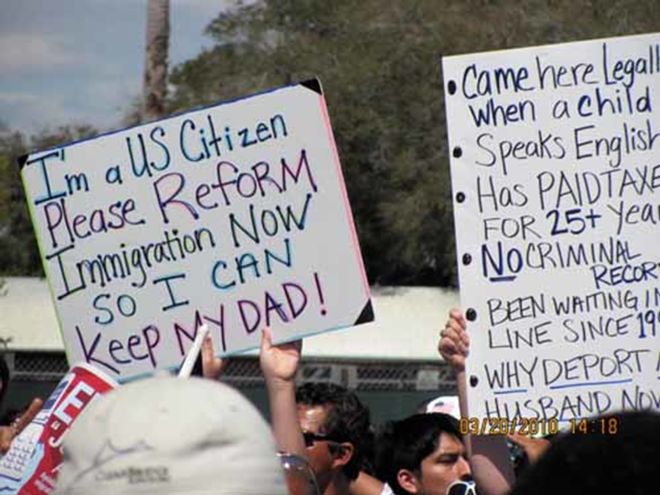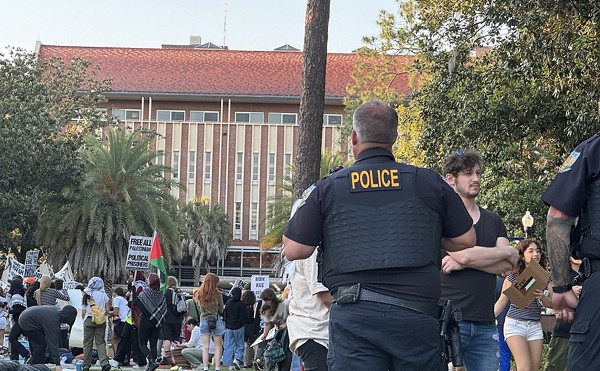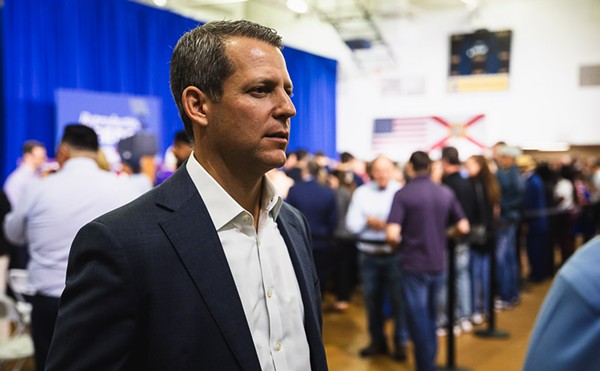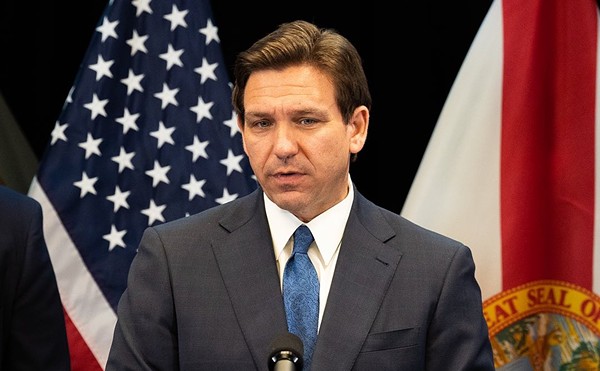
In the spring of 2006, hundreds of people in Tampa — and millions nationwide — participated in protests over current U.S. immigration policy. The demonstrations seemed to catch much of the country by surprise, as the nation's growing Latino population declared in cities across the nation that they wanted to become part of the American dream, and called for legislation to allow undocumented people to no longer be declared "illegal."
Negotiations in Congress for a bill on comprehensive immigration reform broke down later that year, but were revived in 2007, with former Florida U.S. Senator Mel Martinez becoming one of the main architects of a bi-partisan proposal, only to see Senate Majority Leader Harry Reid pull it from the floor when it was apparent that it could not garner enough votes to avoid a filibuster.
Since then, Congress hasn't touched the issue. Unless you count the just-concluded loud and contentious national debate on healthcare, in which there was one thing that actually did achieve bipartisan consensus: None of the 32 million Americans ultimately granted health coverage through the new bill will be of the undocumented variety.
But could things be changing? Last month, Senator Reid told another gathering of immigrant advocates in Nevada that action on the issue was coming — this year.
That followed a huge protest on March 21 in Washington, when an estimated crowd of more than 200,000 flocked to the nation's capitol to call for immigration reform. Unfortunately for them, it was the same day that the House of Representatives spent more than 11 hours debating and ultimately voting for a healthcare reform bill. That vote dominated the news cycle, and stories of the rally were relegated to the inside pages of the country's newspapers.
Though some activists at the march expressed disappointment that the rally elicited much less media coverage than anticipated, Lorena Colin with the Mexican American Coalition, was not among them. "There were at least eight members of Congress who talked at the rally even though the healthcare debate was going on," she said. Colin appeared days before the rally on the USF Tampa campus for a discussion on the rally and the state of comprehensive immigration reform.
Another guest panelist at USF was Ernesto Vargas, the Tampa field organizer for Democracia USA. He thought the march in D.C. was a revelation, but also commented on the lack of press coverage that day. "We need to work a little harder on getting the media's attention, and I hope [at] the next events we make sure the media's there and are paying attention to what we do, because this is an issue that's really important. Not just for Hispanics and the immigrant community, but the whole country."
Vargas was also there to advocate for The DREAM Act (which stands for Development, Relief, and Education for Alien Minors), a bipartisan proposal that has been bouncing around Congress for nearly a decade. It would create a pathway to citizenship for thousands of young students who were brought to the United States years ago as children.
Former Florida Senator Mel Martinez was a co-sponsor of that legislation, and according to Jessica Sanchez, a Central Florida organizer for Reform Immigration for America, his successor, George LeMieux, is being targeted by various advocacy groups to get behind the bill. (LeMieux's office failed to return our calls or e-mails on where he stands on the issue.)
In the House of Representatives, Chicago area Democrat Luis Gutierrez has introduced a bill that would legalize the status of millions of undocumented immigrants. Though it has over 90 co-sponsors, Colin says that House Speaker Nancy Pelosi won't allow any debate on it until there's some movement in the U.S. Senate on the volatile issue.
In the Senate, last month, New York Democrat Charles Schumer and South Carolina Republican Lindsey Graham released a proposal on immigration reform, but have yet to file a bill.
But in an op-ed penned in the Washington Post, the two laid out what they termed the four pillars of their proposal: requiring biometric Social Security cards to ensure that illegal workers cannot get jobs; fulfilling and strengthening commitments on border security and interior enforcement; creating a process for admitting temporary workers; and implementing a tough but fair path to legalization for the 12 million or so undocumented people already here.
Colin — who works out of Chicago — says the Senate bill isn't going anywhere until a second Republican joins Graham in support. "We have a third and fourth Republican" waiting in the wings to support a bill, she says, but they won't come out until a second GOP Senator joins Graham.
Tampa area Congresswoman Kathy Castor agrees, saying, "The plan as I understand it is for the United States Senate to take action first. So for anyone who's particularly interested, let's see what happens in the Senate, because they've gotta get some Republicans who will play a constructive role."














